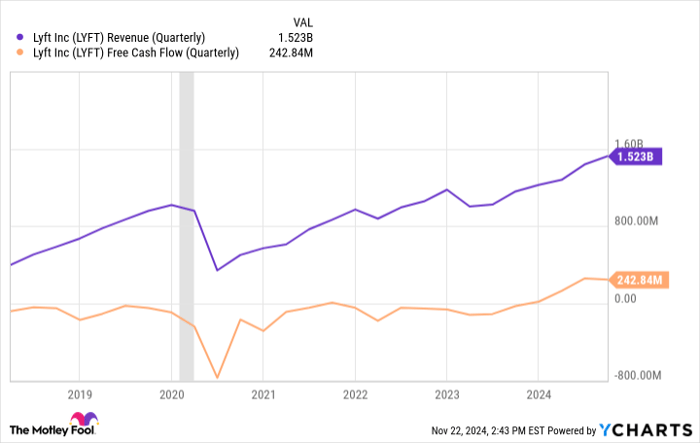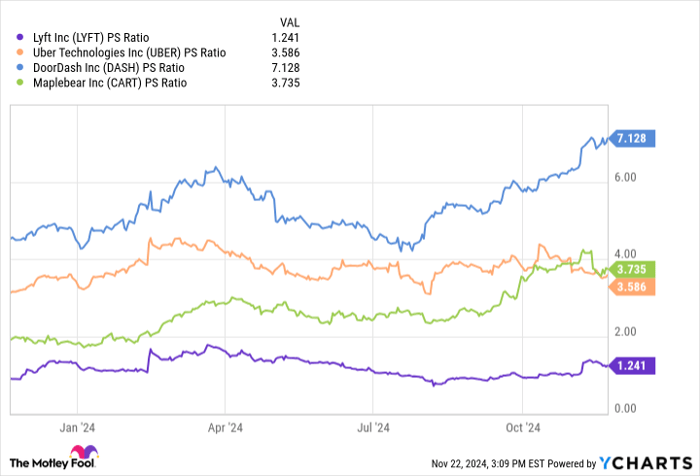David Tepper is a billionaire hedge fund manager known for founding the Miami-based investment firm Appaloosa Management. Back in September, he sat down for an interview with CNBC during which he expressed an outsized bullish stance on investing in China. Naturally, his comments led many investors to speculate which Chinese stocks the acclaimed investor may like.
Well, thanks to 13F filings, investors have their answer. During the September-ended quarter, Appaloosa scooped up shares in Chinese online retailers PDD Holdings and JD.com.
While I'm intrigued by these moves, Tepper made another decision during the third quarter that I found even more curious. Namely, the billionaire bought 7.8 million shares of Uber's primary rival, ride-hailing platform Lyft (NASDAQ: LYFT), increasing Appaloosa's position by 97%.
Below, I'm going to detail what may have influenced Tepper's decision and explain why I like the purchase. More importantly, I'll assess some valuation trends to help determine if now is an optimal time to follow Tepper's lead and pounce on Lyft stock.
Lyft's quiet turnaround is impressive, and...
Lyft has experienced some notable challenges in recent years. For starters, the COVID-19 pandemic took a toll on the travel industry at large; meanwhile, Uber has spent the last few years turning itself into much more than a ride-hailing app.
Through a series of acquisitions, Uber has started penetrating new markets, including food and alcohol delivery. These moves have turned Uber into a more ubiquitous platform overall, specializing in convenience-as-a-service rather than just an alternative to traditional mobility options.
LYFT Revenue (Quarterly) data by YCharts
In the chart above, you can see that Lyft's growth really took a nosedive around the time of the COVID-19 pandemic (shaded in the grey bar). Since then, the trends illustrated above demonstrate that the company has quietly been executing on an impressive turnaround over the last few years.
Let's dig into some of the finer details and explore how Lyft navigated such a challenging environment over the last few years.

Image source: Getty Images.
...the ride could just be getting started
One of Lyft's biggest recent wins is its Price Lock program, which caps prices for riders who frequently take the same rides on a recurring basis. Looked at another way, Price Lock is Lyft's way of trying to acquire commuters on their way to work.
On the surface, I was skeptical that a campaign like this would actually work. After all, why can't commuters just drive themselves or take public transportation such as the subway or bus?
Well, during the company's third-quarterearnings call management shared with investors that Lyft has 200,000 active Price Lock passes and that "commute rides make up nearly half of rides Monday to Friday."
In some ways, the demand for Price Lock has added a layer of recurring, predictable business for Lyft. And as such, the company has been able to yield stronger unit economics overall.
| Category | Q3 2023 | Q4 2023 | Q1 2024 | Q2 2024 | Q3 2024 |
|---|---|---|---|---|---|
| Gross bookings (in billions) | $3.5 | $3.7 | $3.7 | $4.0 | $4.1 |
| Rides (in millions) | 187.4 | 190.8 | 187.7 | 205.3 | 216.7 |
| Active riders (in millions) | 22.4 | 22.4 | 21.9 | 23.7 | 24.4 |
| Adjusted EBITDA (in millions) | $92 | $67 | $59 | $103 | $107 |
| Free cash flow (in millions) | ($329) | ($248 ) | ($0.2) | $368 | $641 |
Data source: Investor Relations.
There is a lot to unpack from the table above. The most important theme from my perspective is that Lyft has been able to actually translate the uptick in bookings and riders to profitability. At this time last year, Lyft was burning cash. Now, the company is not only consistently generating positive free cash flow, but the rate at which profitability metrics are rising is accelerating.
As the macroeconomic picture continues to strengthen thanks to cooling inflation rates and reduced borrowing costs, I see even better days ahead for Lyft.
Lyft stock looks like a bargain
One thing to note about Lyft's financial profile is that even though the company is now generating positive cash flow, it's still not consistently profitable on a net income basis. For this reason, it's a not entirely helpful to value Lyft using methods such as the price-to-earnings (P/E) or price-to-free cash flow (P/FCF) multiples.
LYFT PS Ratio data by YCharts
Right now, Lyft is only trading at about 1.2 times its sales -- far lower than its peers in ride-hailing and delivery services. I find this dynamic peculiar considering that Lyft is a much more sophisticated and larger enterprise today than it was in the past.
In my eyes, it's this disparity that has been influencing Tepper's decision to double down on Lyft. Tepper looks for deep value stocks, and from my point of view Lyft has essentially been written off in favor of other opportunities in related markets.
I see Lyft as a no-brainer buy right now and think the stock is trading at a bargain. The financial trends explored above suggest the company is finally kicking into a new gear.
Should you invest $1,000 in Lyft right now?
Before you buy stock in Lyft, consider this:
The Motley Fool Stock Advisor analyst team just identified what they believe are the 10 best stocks for investors to buy now… and Lyft wasn’t one of them. The 10 stocks that made the cut could produce monster returns in the coming years.
Consider when Nvidia made this list on April 15, 2005... if you invested $1,000 at the time of our recommendation, you’d have $839,060!*
Stock Advisor provides investors with an easy-to-follow blueprint for success, including guidance on building a portfolio, regular updates from analysts, and two new stock picks each month. The Stock Advisor service has more than quadrupled the return of S&P 500 since 2002*.
*Stock Advisor returns as of November 25, 2024
Adam Spatacco has no position in any of the stocks mentioned. The Motley Fool has positions in and recommends DoorDash and Uber Technologies. The Motley Fool recommends Instacart and JD.com. The Motley Fool has a disclosure policy.
The views and opinions expressed herein are the views and opinions of the author and do not necessarily reflect those of Nasdaq, Inc.




